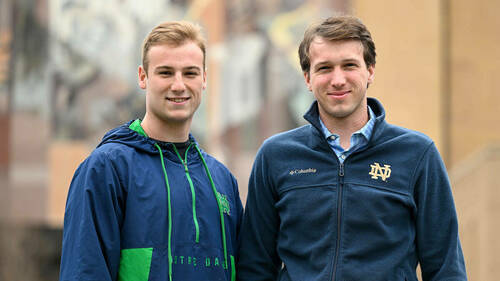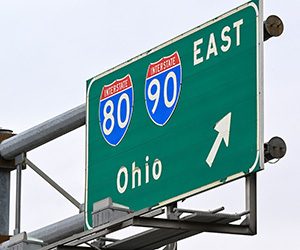
It was spring break as usual for a couple of University of Notre Dame sophomores earlier this month. Mike Oblich from Erie, Pennsylvania, and Jack Zagrocki of Pittsburgh departed campus with friends for a few days of fun and sun in Fort Lauderdale, Florida. Upon their return, the students landed at Chicago’s O’Hare Airport on March 10 and hopped into their car to head back to campus.
But on the Indiana Toll Road, both the nice weather and enjoyable respite of spring break quickly took a bad turn. It was about 11 p.m. as the Notre Dame students made their way back to South Bend just as a freak snow and ice front was passing through. They slowed their speed considerably in the dark stretch of highway with no homes or businesses nearby for miles.
Very few vehicles were on the road — just one car ahead of them of Notre Dame friends who were also returning from Florida, along with a third vehicle. All three vehicles were driving slowly because of the road conditions when the third car, the one not being driven by Notre Dame students, hit a patch of ice and spun off the road, down a steep embankment and into a ditch.
And if you believe in divine intervention, here’s where the story gets interesting. Oblich is a biochemistry/pre-medicine major at Notre Dame with a minor in compassionate care. Zagrocki is a mechanical engineering major who worked as a lifeguard and is certified in CPR.
Oblich and Zagrocki were stunned at what they had just witnessed, but their instincts kicked in. They knew they had to stop to check on the other car. “It was the just right thing to do,” Mike said. “It was human nature to see if they were OK or if we could help.”

While still donning their spring break attire of T-shirts, light jackets, shorts and sneakers, the students pulled off the road and slid down the ravine to find the SUV littered with broken glass from shattered windows and windshields. The car had struck some small trees and bushes. They could see parts of wreckage protruding from the front windshield and the driver’s side door was severely damaged. They also saw two passengers inside the car — driver Andy Kravetz and his daughter.
“They were both coherent and talking when we got to them,” Oblich said. “But they looked like they were in shock and the driver was really distraught.”
“I was actually terrified,” Kravetz said as he described what happened. “We had been driving from our home in Peoria, Illinois, for a couple of hours. The roads were awful; it was snowing and windy. And it was dark. We had no idea where we were or what happened when out of nowhere, we see two people with a flashlight coming down into the ravine to help us.”
Seeing a lot of glass and a badly damaged vehicle, the students acted quickly to help the family from the car. Zagrocki led the daughter back to their SUV to keep warm and dry and called for emergency assistance, needing to rely on the technology of his smartphone to drop a pin for the state police to find their location. Oblich stayed at the vehicle and spoke to Kravetz’s wife on the phone to assure her that they were being helped.
“I haven’t had any clinical medical training yet,” Oblich, the pre-med major, said. “But I knew enough from what I’ve learned so far in my classes about how to remain calm and be present for the victims.” Both students managed to get Kravetz out of the vehicle after wrestling with the damaged driver’s side door, and Oblich leaned into his early medical training instincts and assessed Kravetz to make sure there was no bleeding or other noticeable injuries. Then the two students helped him to their car to wait for the authorities.
“It was a miracle that they weren’t injured,” Zagrocki said.
While waiting for the state police, the students learned that the Kravetzes were also on their way to the Notre Dame campus for a youth hockey tournament at the Compton Family Ice Arena.
“We insisted on waiting with them until the state police arrived and then we drove them to South Bend,” Oblich said. “They were going to the same place as we were. It didn’t make sense to just leave them there with no car, in the middle of the night in a snowstorm to find another way to South Bend.”
As newspaper reporter who focuses on crime, Kravetz describes himself as jaded from seeing so much trauma and wrongdoing in his 30-year career. “I’ve seen the worst in people,” he said. “But my faith in humankind has been restored by what these guys did for me and my family. They didn’t have to stop, let alone take us to their car to stay safe and warm. And they insisted on driving us to South Bend. I don’t know what we would have done if they didn’t stop.”
Kravetz coaches his daughter’s team, so he had not only her equipment in the car, but also bags of hockey gear that the coach usually brings. “We had to pack up sticks, pucks, a white board and their luggage,” the students said.
“They helped me clean out my car,” Kravetz explained. “The bag of pucks alone probably weighed 15 pounds. And I’m a reporter so I basically live out of my car. There was a lot of stuff in there.”
The students finally were able to drop off the family at a local hotel at about 2 a.m. and returned to campus. “We were just glad they were OK,” Zagrocki said.
“We don’t feel like we did anything significant,” Oblich said humbly.
But Kravetz disagrees. “What they did was a big deal,” the grateful father said. “They chose to do the right thing in a split second when it mattered and that’s what makes them so freaking awesome. How many of us can say that we did the next right thing when it was our turn? They did the right thing by stopping, helping, waiting and driving us. I’m forever in their debt.
“These two young men were literally angels. We aren’t Catholic so I don’t know what the Catholic term is, but they were clearly sent from heaven.”